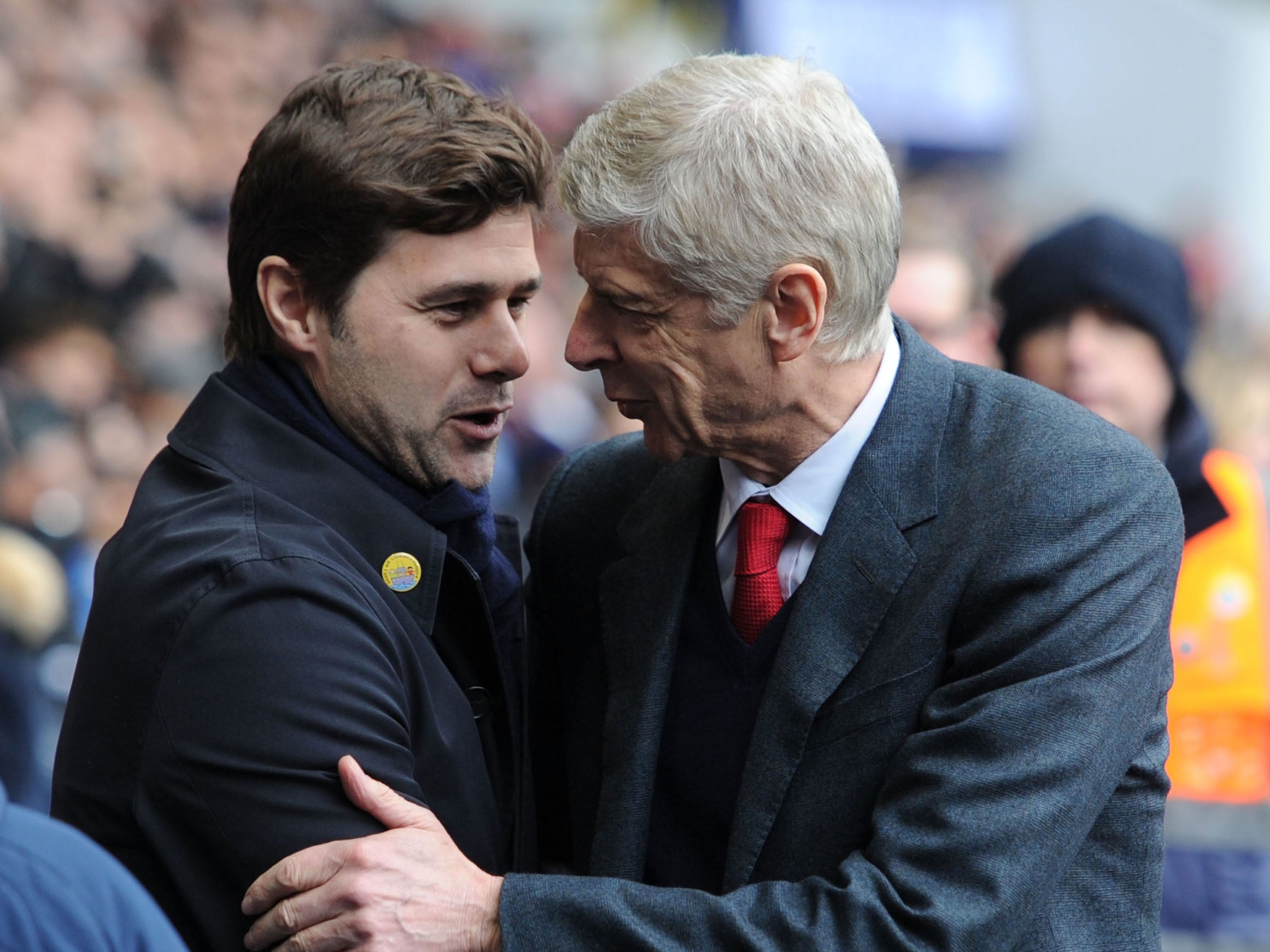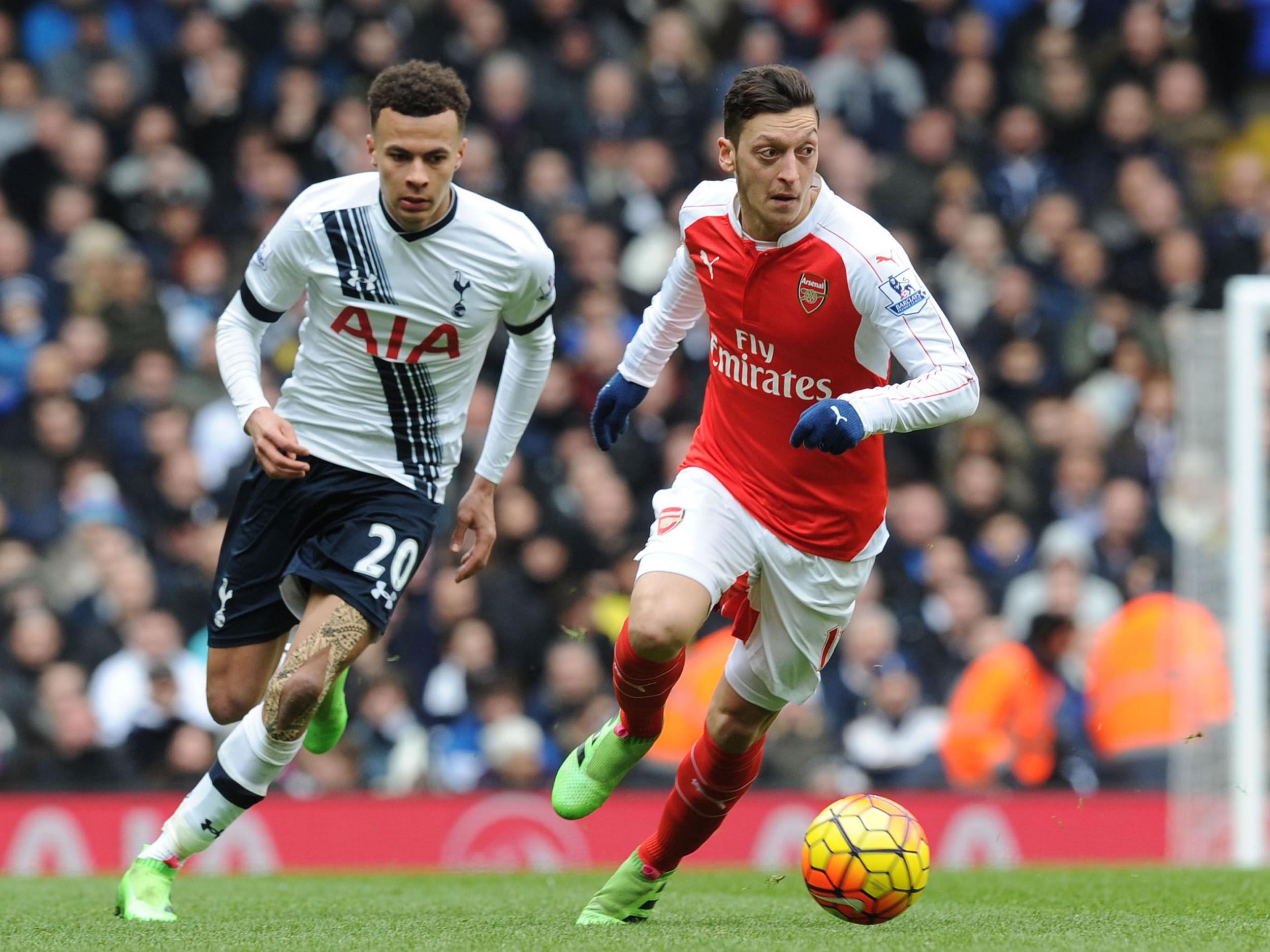Arsenal vs Tottenham: North London derby lacks history of others but there are none more significant this season
Times are changing and, perhaps for the first time in history, this weekend's clash may be entitled to bill itself as the most important derby in English football

Ok, so let’s be deliberately provocative – the north London derby is just that, a fixture which means everything to those geographically connected to it, but virtually nothing to those north of the M25 or south of the River Thames.
It does not mean much to those in the East End or west London either, so do not expect clocks to stop in Manchester, Liverpool, Birmingham or Leeds when Arsene Wenger’s team host Mauricio Pochettino’s players at the Emirates Stadium on Sunday.
Of the Premier League’s classic derbies – encounters between city rivals – Arsenal versus Spurs lacks the history of those on Merseyside, when Liverpool and Everton spent the best part of the 1980s locked in a two-way battle for national supremacy, while the long-dormant United versus City rivalry in Manchester has now exploded into a game which matters locally, nationally and across the globe.
Arsenal versus Spurs? Well, there are memories of Paul Gascoigne’s free-kick in the 1991 FA Cup semi-final at Wembley, Arsenal clinching the league title at White Hart Lane in 1971 and 2004 and some pretty poisonous abuse directed at Sol Campbell following his move from Spurs to Arsenal in 2001, but the problem with the north London derby over the years is that it has lacked significance beyond its own surroundings.
Liverpool and Everton have battled it out for league titles and domestic cups, as have, in recent years, United and City, but it has all be a touch too one-sided in north London for anyone unconnected to the game to spend too much time worrying about the wider consequences of the outcome of meetings between the two teams.
Yet times are changing and, perhaps for the first time, the 179th north London derby this weekend may be entitled to bill itself as the most important derby in English football.
In terms of significance to the title race, no other Premier League derby matters quite as much as this season as Arsenal versus Spurs.
Both clubs are serious title challengers and that is something that neither Manchester nor Merseyside can boast about their two heavyweights this season.
Manchester City top the table and will undoubtedly prove the biggest threat to north London providing the Premier League champions this season, but not even the most optimistic United supporter would waste a fiver on Jose Mourinho’s team contesting the title race.
Having won 13 title since the inception of the Premier League in 1992-93, United remain, by some distance, the most successful club of the past 25 years, but they are nowhere near adding to their roll of honour right now and they find themselves in the role occupied by City for almost four decades as also-rans in the battle for the title.
So the Manchester derby, for all of its global appeal, is style over substance right now. It does not matter as much as the north London derby.
Liverpool versus Everton? The same applies as in Manchester.
Everton may be stirring under Ronald Koeman and they clearly possess the ability to cause problems for any title contender, particularly at Goodison Park, but like United, they are not title challengers.
Liverpool may well prove to be under Jurgen Klopp, and their form this season suggests they can finally end Anfield’s 27-year wait for the league championship this season, but when they face Everton, it will be local pride rather than two teams slugging it out for an edge in the title race.
It is now thirty years since Merseyside was the centre of English football’s universe and clashes between the two clubs in the mid-1980s, when the league championship trophy was housed either side of Stanley Park for seven consecutive years, were truly significant encounters.

During that period, the Merseyside derby was as decisive and significant as the Old Firm rivalry or games between Inter and AC Milan.
Manchester threatened to replicate Merseyside as the hub of English football at the outset of this decade, with City and United rotating as champions for four successive seasons, but while City’s star has risen, United’s has dimmed and the self-styled second city must now defer to London on the football pitch.
But while the north London derby is becoming a more important fixture on a national level, it will only continue to do so if the two clubs are able to put silverware in their respective cabinets.
It requires both clubs to become winners, otherwise the imbalance would send the game back into the pack along with Manchester and Merseyside.
And it still has some catching up to do in terms mattering to people beyond London and around the globe.
Manchester United versus Liverpool remains, by some distance, the most-watched Premier League fixture around the world, with Chelsea versus Liverpool second, largely due to a series of seismic clash between the two teams during the last decade.
And in terms of derbies, north London is vying with Merseyside for second spot behind Manchester when it comes to catching the attention of the football world on television.
But Arsenal and Spurs are clearly on the up and it is a testament to the work of Wenger and Pochettino that their encounter on Sunday will ensure that the north London derby can justifiably claim to be the most important in English football.
Join our commenting forum
Join thought-provoking conversations, follow other Independent readers and see their replies
Comments